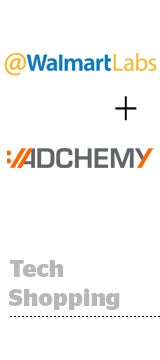 Big box retailer Walmart’s software and technology accelerator @WalmartLabs has acquired Adchemy, the developer of a SaaS platform that essentially makes retail product search smarter.
Big box retailer Walmart’s software and technology accelerator @WalmartLabs has acquired Adchemy, the developer of a SaaS platform that essentially makes retail product search smarter.
Silicon Valley-based @WalmartLabs, which employs 2,100 people, was founded three years ago as a way to develop and scale technology to tap into online buying patterns of the store’s 245 million weekly shoppers. Adchemy, which employs 60 people, is the Labs’ 12th acquisition and the most sizable deal yet in terms of head count, the company said.
Adchemy last fall divested its lead-generation and performance-marketing business, called “Actions,” to XL Marketing, which has since been rebranded as Zeta Interactive. The company said at the time it intended to focus on software instead of services.
Adchemy VP of Products and former Yahoo engineer Ethan Batraski (who is joining @WalmartLabs) noted that one of the greatest challenges for retail marketers is accurately matching products to queries. This is where predictive and data-driven optimization, can help detect the nuances between consumer intent and merchants’ best-selling, and (properly) priced, products.
@WalmartLabs is not the only tech-incubator offshoot developed by a retailer.
Office supply store Staples, for instance, last fall acquired marketing personalization platform Runa for its Staples Innovation Lab. This happened around the time @WalmartLabs grabbed predictive analytics company Inkiru, whose algorithms Walmart claims are now applied to 100% of transactions. Walmart credits the development of an internal search engine to its Web search and categorization acquisition of Kosmix in 2011, the first for its Labs division.
Others are getting in on the action, too. EBay bought pricing research and data company Decide.com last fall, noting the company’s patent-pending “machine-learning and text-mining algorithms” as a core driver. The bottom line is retailers from Staples to Walmart to Home Depot (which also has an Innovation Lab) who’ve mastered the offline component now need to master online as well.
While the brick-and-mortar business remains a big investment priority (60%-plus of retail transactions still occur in-store), measuring and optimizing cross-channel customer journeys can help retailers become more data-driven in-store.
Update: With regard to Adchemy, product-centric paid search ads are among the highest drivers of ROI for ecommerce companies with both Google and Bing “rapidly evolving their offerings,” said Jason Goldberg, VP for commerce strategy at Razorfish. “Adchemy is ideally suited to allow business users at Walmart to leverage those types of product-centric listings in a programmatic way, which is essential when you offer 6 million SKUs on your ecommerce site.”
This particular deal is both about talent and IP, said Ray Wang, principal analyst and founder of Constellation Research.
“Adchemy had some smart PhDs who understood semantic search and other advanced technologies for ad targeting,” he said. “Adchemy started out in the lead-gen space, but ended up with a wicked cool entity graph. The core Walmart Labs proposition is set up to help Walmart improve their own performance and more importantly retain the key talent they need to grow out” the Labs division.
Walmart has in recent quarters surpassed even Amazon’s online growth rate, which is telling given Walmart’s origins are its brick-and-mortar base. As Goldberg pointed out, when Walmart makes a tech move, the commerce space feels the residual effect. “Their recent acquisition of Torbit was one such example. … The rest of the ecommerce industry had to scramble to find another suitable provider of real user-monitoring capabilities.”











